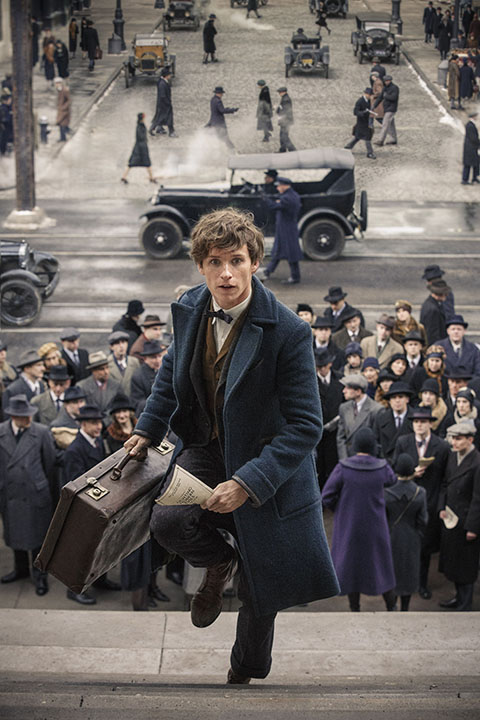
By Lindsey McLemore | Reporter
J.K. Rowling’s “Fantastic Beasts and Where to Find Them” is an expansion of the Harry Potter universe that also invites new and returning audiences to find their place in the wizarding world.
As a lifetime fan, I spent the entire film wand-in-hand and on the edge of my seat. The second time I saw it, I brought friends who had never seen Harry Potter before — their eyes were wide and their mouths open in awe from start to finish.
Newt Scamander (Eddie Redmayne) is a lovably awkward magi-zoologist (and easily my new favorite character in the entire franchise) who arrives in New York City with an entire case of fantastic, magical creatures. When some of those creatures escape, he must capture them quickly.
Scamander’s passion for misunderstood creatures and his mission to make them more incorporated into the magical community make him a welcomed hero to the Harry Potter universe.
The film takes place 70 years before Harry Potter’s adventures at Hogwarts School of Witchcraft and Wizardry, and the important role of Jacob Kowalski (Dan Fogler), a no-maj (American wizarding term for non-magical people), helps new audiences learn the terms and rules of the wizarding world. However, Kowalski serves a much higher purpose than just asking questions, which is something I was worried about going in.
Having an adult cast meant darker and more mature situations than would have been appropriate for a new class of grade-school wizards. Fans like myself, who grew up with the series, were still able to relate to the characters on a more personal level.
In the 1920s, when the film occurs, Gellert Grindelwald causes massive attacks throughout Europe and then goes missing. Grindelwald intends to lead a revolution in which the magical community will no longer live in hiding. Considered one of the most dangerous dark wizards of all time in later films, Grindelwald refers to the underground magical community as “rats in the gutter,” to which he “refuses to bow down any longer.”
If Grindelwald is the wizarding world’s Adolf Hitler, he makes Lord Voldemort look like Mussolini.
Knowing what little bit of his backstory has been given, I am very excited to see the development of his character in future films.
Similarly, the Second Salemers, a group of no-majs who spend much of the movie trying to convince the general public that witches and wizards are a very real and pressing danger, are demanding the investigation (and likely mass-burnings) of suspected witches. However, their place in the future of the series is uncertain to say the least.
This and the presentation of American governance in contrast to the aspects of British governance presented in the previous Harry Potter films (particularly capital punishment) leads me to question whether this film was intended to build up the overall plot or just present the differences between American and British wizarding culture.
While no unforgivable curses (killing curse, mind control, immense physical pain) are seen in this film, there is a dark sequence in which one character is sentenced to self-inflicted death.
From a technical standpoint, “Fantastic Beasts” does have some problems. Overall, the screenplay is kind of rough.
There are not many plot holes, but the ultimate revelation of Grindelwald’s character seemed to come out of nowhere — even with extensive knowledge of the expanded universe. There was no dialogue or even presentation of his identity to the audience, but somehow Scamander knows who he is.
The film seemed oddly paced at times – maybe one too many fantastic beasts and not enough development of the overall plot of the series. A subplot involving a senator and a newspaper didn’t seem to go anywhere and honestly could have been excluded.
It was a bold move for Rowling to write the screenplay, but after seeing the film a few times, I understand why. If anyone else had done it, it wouldn’t have been as personal.
Rowling was able to create a new story, confirm long-discussed fan theories about the universe and still make new audiences feel included in the magic.
Quick subtle references to the existing Harry Potter universe (quidditch positions and Hufflepuff scarves) felt like coming home.





